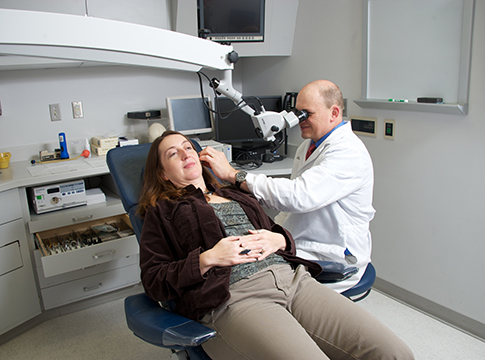Why You Might Need an ENT Clinic for Recurring Symptoms
Wiki Article
Exploring the Area of Otolaryngology: What to Expect When You Get In Touch With an ENT
Otolaryngology, commonly described as ENT, includes the diagnosis and therapy of ear, throat, and nose conditions. For those experiencing related issues, seeking advice from an ENT professional can give quality and relief. Comprehending what to anticipate during such assessments is important for efficient communication and care. This summary will certainly describe key aspects of the ENT experience, consisting of common reasons for gos to and the procedures associated with medical diagnosis and treatment.
Recognizing Otolaryngology: A Summary
Otolaryngology, often referred to as ENT (Ear, throat, and nose) medicine, is a specialized branch of medication that concentrates on the medical diagnosis and treatment of conditions affecting these crucial areas of the body. This area includes a vast range of problems, consisting of those pertaining to hearing, balance, breathing function, and speech. Otolaryngologists are educated to take care of both surgical and medical treatments, utilizing sophisticated techniques and innovations. Their proficiency expands beyond traditional ailments, resolving problems such as allergic reactions, sinus infections, and hearing loss. In addition, they play an essential duty in the management of head and neck cancers, providing thorough care tailored to private client demands. In general, otolaryngology remains crucial for keeping health and top quality of life in affected people.Typical Factors to See an ENT Specialist
Numerous individuals seek the proficiency of an ENT professional for a range of factors, showing the diverse nature of conditions that influence the nose, ear, and throat. Common problems include chronic sinusitis, which usually causes consistent nasal congestion and face pain. Allergies and their linked signs, such as sneezing and itching, also trigger brows through to these professionals (Hearing). Hearing loss, whether unexpected or steady, is an additional considerable reason for assessment. Additionally, individuals may look for analysis for throat disorders, including consistent hoarseness or ingesting problems. Sleep apnea, characterized by disturbed breathing during sleep, is frequently dealt with by ENT professionals also. Each of these problems highlights the importance of specialized care in taking care of complicated ENT-related health concerns
Preparing for Your ENT Appointment
When preparing for an ENT appointment, it is vital to gather pertinent details and consider any type of particular concerns. People ought to assemble an in-depth case history, consisting of previous ear, nose, or throat issues, surgical procedures, and present medicines. Recording signs-- such as frequency, intensity, and duration-- can supply useful understandings for the ENT professional. Furthermore, individuals ought to prepare a listing of concerns they want to ask, guaranteeing that all worries are addressed throughout the see. Bringing along any kind of appropriate medical documents or examination results can even more assist the ENT in understanding the client's problem. Ultimately, clients must verify their appointment information, including area, time, and day, to decrease any type of final complication. Correct preparation can boost the efficiency of the assessment and result in much better end results.What to Expect Throughout the Assessment
As the consultation starts, the person can expect to engage in a comprehensive conversation with the ENT specialist about their signs and case history. The specialist will inquire regarding the duration, frequency, and seriousness of signs and symptoms such as hearing loss, nasal congestion, or aching throat. Additionally, the client's previous clinical conditions, medicines, and any pertinent family history will be evaluated, aiding the professional in developing a complete understanding of the individual's wellness. The ENT might also inquire about lifestyle variables, such as direct exposure to allergens or irritants. This open dialogue establishes a structure for the consultation, ensuring that the patient's concerns are dealt with and setting the stage for any essential evaluations or referrals for therapy.
Analysis Examinations and Procedures in Otolaryngology
A range of analysis tests and treatments are crucial in otolaryngology to accurately review and detect conditions affecting the throat, ear, and nose. Typical examinations consist of audiometry, which gauges hearing feature, and tympanometry, examining center ear pressure. Nasal endoscopy enables visualization of the nasal flows and sinuses, while laryngoscopy examines the throat and singing cords. Imaging techniques, such as CT scans and MRIs, give comprehensive views of head and neck frameworks. Allergic reaction testing might likewise be performed to determine triggers for sinus or breathing issues. These diagnostic devices enable ENT experts to establish a complete understanding of individuals' problems, making certain tailored and effective monitoring plans. Proper medical diagnosis is vital for effective therapy end results in otolaryngology.Treatment Alternatives Supplied by ENT Specialists
ENT experts supply a range of therapy options tailored to address specific conditions impacting the nose, throat, and ear. These treatments vary from traditional strategies, such as medication and way of life alterations, to even more intrusive procedures. For example, allergic reactions might be managed with antihistamines or immunotherapy, while persistent sinus problems might need nasal corticosteroids or sinus surgery. For hearing loss, ENT specialists frequently recommend listening device or medical treatments like cochlear implants. In situations of throat problems, alternatives can include speech therapy or operations to eliminate blockages. Furthermore, they may supply assistance for handling sleep apnea, including making use of CPAP tools or surgical interventions. In general, the objective is to boost clients' top quality of life with customized treatment and effective treatment methods.When to Seek Follow-Up Care With an ENT
Acknowledging when to look for follow-up treatment with an ENT expert is crucial for handling continuous symptoms or problems connected to nose, ear, and throat problems. People need to take into consideration scheduling a follow-up appointment if signs and symptoms continue in spite of first treatment, such as persistent ear discomfort, nasal blockage, or throat discomfort. Modifications Voice in hearing, balance concerns, or uncommon nasal discharge might additionally call for further evaluation. Furthermore, if a client experiences negative effects from prescribed drugs or has actually undertaken an operation, follow-up treatment is very important to keep track of healing and attend to any type of concerns. Timely appointments can ensure efficient management of problems, protect against prospective complications, and offer peace of mind concerning one's health. Seeking follow-up care advertises positive wellness monitoring in otolaryngology.Regularly Asked Questions

What Credentials Should I Search for in an ENT Professional?
When looking for an ENT specialist, one must seek board accreditation, relevant experience, and strong person testimonials. Furthermore, efficient interaction abilities and a thoughtful approach can substantially enhance the total treatment experience.Exactly how Do I Pick the Right ENT for My Needs?
Picking the best ENT expert entails evaluating their certifications, experience, and patient reviews (ENT Clinic). It is important to consider their interaction design and strategy to treatment, guaranteeing they line up with the individual's particular health demands and choicesAre There Any Risks Related To ENT Procedures?
The threats connected with ENT treatments might include infection, blood loss, anesthesia issues, and possible damage to surrounding structures. People need to discuss these dangers with their medical professional to understand specific issues and warranty informed decisions.How Can I Handle Stress And Anxiety Before My ENT Consultation?
To manage anxiousness prior to a visit, individuals can exercise deep breathing exercises, visualize positive end results, prepare concerns beforehand, and seek support from buddies or family, fostering a feeling of reassurance and calmness.What Should I Do if I Experience Negative Effects From Treatment?
If side impacts from treatment take place, the person ought to promptly report them to their health care supplier. Adjustments to treatment or added interventions may be needed to ensure safety and efficiency in managing their condition - ENT Doctor. As the appointment begins, the patient can expect to engage in a thorough conversation with the ENT specialist about their signs and symptoms and medical history. These analysis devices allow ENT professionals to develop a detailed understanding of clients' conditions, ensuring tailored and efficient monitoring strategies. ENT professionals provide a variety of treatment choices tailored to attend to particular problems affecting the throat, nose, and ear. When seeking an ENT specialist, one ought to look for board accreditation, relevant experience, and strong person evaluations. Picking the appropriate ENT specialist entails examining their credentials, experience, and person reviewsReport this wiki page